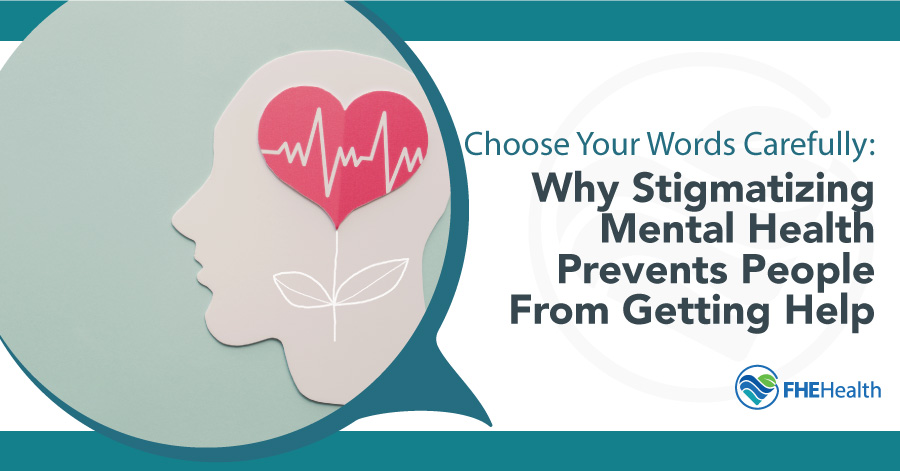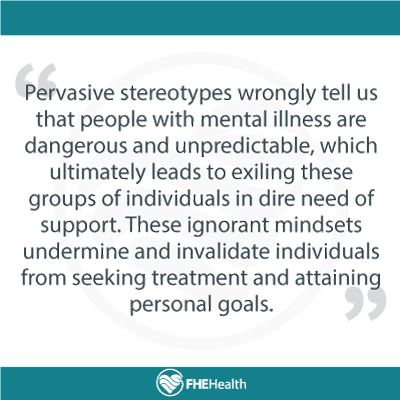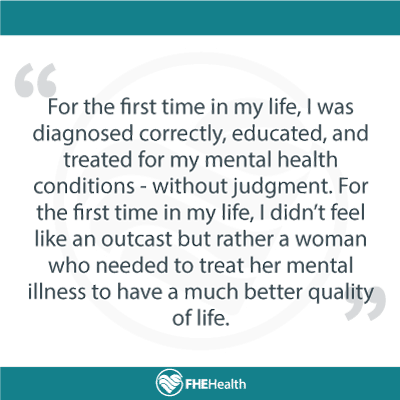
The impacts of mental health effect over 48.3 million Americans in a single year. This startling number pales in comparison to the over 60% of these Americans who never receive treatment for their mental health conditions. While the availability of evidence-based treatment continues to increase, there continue to be millions of Americans who never seek out or receive the care they need. The question is WHY?
 Speaking from personal experience, societal stigmas present significant barriers to individuals struggling with their mental health from seeking professional help. These numbers are staggering, and it’s no surprise that the discrimination and prejudice surrounding mental health conditions are the culprits. The stigma circling the mental health community is an illness itself. Pervasive stereotypes wrongly tell us that people with mental illness are dangerous and unpredictable, which ultimately leads to exiling these groups of individuals in dire need of support. These ignorant mindsets undermine and invalidate individuals from seeking treatment and attaining personal goals.
Speaking from personal experience, societal stigmas present significant barriers to individuals struggling with their mental health from seeking professional help. These numbers are staggering, and it’s no surprise that the discrimination and prejudice surrounding mental health conditions are the culprits. The stigma circling the mental health community is an illness itself. Pervasive stereotypes wrongly tell us that people with mental illness are dangerous and unpredictable, which ultimately leads to exiling these groups of individuals in dire need of support. These ignorant mindsets undermine and invalidate individuals from seeking treatment and attaining personal goals.
For as long as I can remember, I was an anxious child. I was constantly walking on eggshells, waiting for the other shoe to drop, and I can’t remember a time in which I felt true inner peace. I was insecure, consistently seeking validation, and I never really talked much about it. Looking back on my early childhood trauma and the dismissive responses from the adults I was supposed to trust – the proof is in the works. At the early age of 5, I was sexually assaulted, and when I told the adults in my life, my experience was never spoken of again. It was during that same time period I learned that my feelings and even real-life traumatic experiences didn’t matter. My fears, emotions, and pleas were not only minimized but disregarded entirely. Thus, my story continues…
Fast forward into my adolescent years, I was always on edge. I never felt comfortable in my own skin. I can vividly remember always being told I was “too emotional.” These callous responses to my inability to self-soothe or cope with my PTSD created a vicious cycle that I would spend decades working my way out of. The judgmental responses surrounding my obvious cries for help ultimately led me to create a vault surrounding my heart and the defensive inability to express or even face my very own emotions.
I was avoidant to the core; the thought of expressing myself only to be told I was “being dramatic and crazy” was terrifying. I turned inward. I became a recluse and began to view my PTSD and depression as a weakness and not an illness. I began coping by over-exerting myself in any manner I saw fit to try and appease everyone around me. As you can imagine, this eventually led me down a dark, isolating, and fraudulent road. I was no longer willing to talk about how I felt or even personally to acknowledge any type of unwelcoming feeling. Left to my own devices – I began to self-medicate.
It wasn’t long before my untreated mental health conditions led to yet another condition I would attempt to deny to escape societal stigmas. I became a full-blown addict. I will never forget that first sip of vodka the night of my junior prom. I was a perfect candidate for alcoholism all along. I had the predisposition, unhealed trauma, underlying PTSD, and I was desperate for any solution that didn’t require me to ask for help – in fear of judgment. The vodka silenced the judgments of others, or perhaps it relinquished my care for anything other than more vodka. Either way, I really thought I found myself a solution. I didn’t have to talk about my feelings with anyone, I could indulge in copious amounts of liquor, and all seemed to be well – until I progressed.
My mother passed away unexpectedly, and my self-taught, stigma-cultivated coping mechanism was to get as wasted as possible. I called the local drug dealer, and before I stepped foot in the hospital, I numbed myself with opiates. After all, how could I possibly fathom the thought of walking in to grieve the loss of my mother without the fears of what ignorant, judgmental statements would be thrown my way? This led to a five-year stint of spending every single day chasing the desired effect brought on by any and all mood/mind-altering substances.
Vodka and opiates didn’t care that I was emotional. I didn’t have to engage in a conversation where I was told to “suck it up” – it was just me and my anesthetics. If you’re reading this, then I think you know how this story goes. I continued to self-medicate and throw my life away one pill and one drink at a time until it no longer worked. I began getting high and drinking just to roll out of bed. And just like that, I became that mom – the junkie mom.
The amount of guilt, shame, and remorse that followed my incomprehensible demoralizing actions paled in comparison to the judgments I received from everyone around me. I was a broken and mentally sick little girl. It was almost as if I returned to the shell of that five-year-old little girl that never got the support and professional help she needed. Venturing down the rabbit hole 20 years later, I could never understand why I did the things I did.
Why did I promise myself I’d never use again, but yet woke up the following day to my next fix beckoning my call until I obliged? Why was every emotion seemingly insurmountable? Why did I keep doing the same thing over and over again, expecting different results?
 The answer is simple; I didn’t know what I was truly up against. I never knew what I was up against because, at the early age of 5, I was led to believe that the problem was me and not a mental health condition I was failing to address. The judgments and prejudice that surrounded me at an early age ultimately led to my demise. I was unwilling to ask for help out of fear I would never receive help.
The answer is simple; I didn’t know what I was truly up against. I never knew what I was up against because, at the early age of 5, I was led to believe that the problem was me and not a mental health condition I was failing to address. The judgments and prejudice that surrounded me at an early age ultimately led to my demise. I was unwilling to ask for help out of fear I would never receive help.
It wasn’t until I flew down to South Florida and my first therapist validated my experience and educated me on the long-term effects of trauma that I had the opportunity to heal. For the first time in my life, I was diagnosed correctly, educated, and treated for my mental health conditions – without judgment. For the first time in my life, I didn’t feel like an outcast but rather a woman who needed to treat her mental illness to have a much better quality of life. For the first time in my life, I had a shot at finding a real solution.
The stigmas surrounding mental health can be the barrier that prevents an individual from seeking the help he/she may need and living a life worth living. My untreated PTSD and depression made me feel not only isolated but hopeless so many times. The stigmas handed down to me when I needed to support the most led me to some of the darkest moments of my life.
If you are reading this and don’t quite understand mental health – I challenge you to educate yourself. Share what you learn with your family, friends, and coworkers. Take the time to immerse yourself with those of us struggling with mental health; I promise you we are so much more than our diagnosis.






